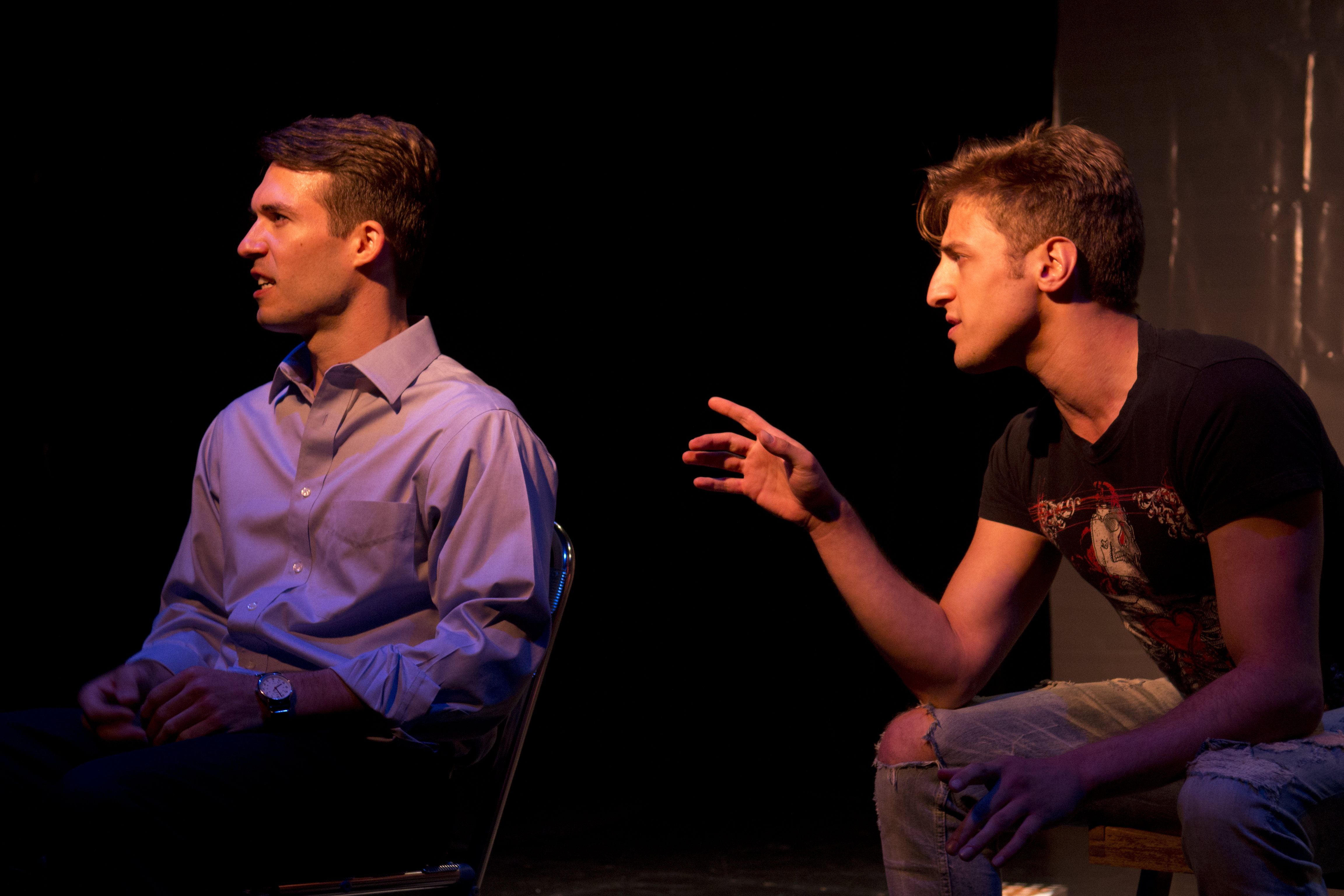
FringeNYC Review: “The American Play”
Writer: Ashley J. Jacobson / Director: Darren Johnston
1 hour, 20 min.
BY SEAN EGAN | Patrick Bateman, the protagonist of Bret Easton Ellis’ perennially controversial novel, “American Psycho,” is a filthy rich, meticulously dressed playboy, who works on Wall Street by day, and operates as a gruesome serial killer by night. In terms of hero worship, there’s just about no one worse to idolize (fictional or otherwise) than Bateman — but what might happen if a few wayward individuals did?
Ashley Jacobson’s “The American Play” takes that seed of an idea, and uses it to open up a wider conversation about male entitlement and rape culture — things that are unfortunately prevalent, and go largely unaddressed, in society.
After meeting in a collegiate American Lit class — and bonding over grossly misinterpreting Ellis’ satirical work as a ringing endorsement of hedonism and unchecked patriarchal dominance — rich kid Luis (John C. Nagy III) takes Tim (Michael DeBartolo), a poor kid trying to forget his abuse-filled past, under his wing. He quickly begins grooming Tim into a high-class socialite like himself — using Bateman as his shining example of how a man should be (minus the nasty murder business). Things spiral out of control once Shelly (Jen Jacobs), a girl from Tim’s past, enters the picture — and Jacobson doesn’t hesitate to go to some truly dark, sordid places.
Luis and Tim’s relationship escalates too quickly, spouting off the most extreme, toxic opinions until they become unbelievable caricatures of the attitudes being criticized. This undercuts the play’s treatment of the incident of sexual assault that much of the action revolves around — it practically implies that incidents like this are solely the work of extreme and obviously disturbed individuals who obsess over violent media, which is certainly not the case.
On a structural level, the play flash-forwards to police investigations post-incident, which only helps to deflate any narrative tension the play could have built, and lessens the horror of the brutal climax. These scenes are punctuated with readings from an Internet comment thread, where anonymous commenters voice their opinion on the incident. The on-the-nose comments run the gamut of misled and harmful societal attitudes — everything from victim blaming and slut-shaming to anti-feminist attitudes and rape apologist sentiment. It’s certainly incendiary (not a bad thing given the subject matter), but it’s also not entertaining — further contributing to the feeling that you’re listening to a lecture rather than being told a story.
Still, the play is a polished and professional production. It’s staged sparingly, but effectively, by director Darren Johnston, who employs stylish video effects to enhance the experience. In addition, the abusive mentor/mentee relationship, as implausible as it seems, makes for some electrifying scenes, particularly as it progresses. Nagy is compulsively watchable as the embodiment of entitlement and self-regard, and DeBartolo is genuinely unnerving as Tim reveals his dangerous nature, and spirals into Id-driven madness. Their shifting power dynamic is the most thrilling aspect of the play, especially as Tim becomes more unhinged. The development of this relationship, however, comes at the expense Jacob’s Shelly, a warm and welcome stage presence, whose inner psychology is not examined as closely as the leading men’s.
Using Ellis’ own prose, “The American Play” probes: “Is evil something you are? Or something you do?” The show provides no definitive answer to this question — instead, it implies that evil is a natural force in the world, manifesting itself in both the overt monstrosity of Tim and Louis, and their misogynistic, abusive ilk, as well as the more subtly insidious discourse prevalent in society, which proliferates under the blanket of anonymity the internet provides. It’s a chilling worldview to be sure, and an affecting message — but they could stand to be presented in the context of a slightly more nuanced and compelling manner.
Fri. Aug. 21 at 4:45 p.m., Tues. Aug. 25 at 2:30 p.m., Thurs. Aug. 27 at 7 p.m., Sat. Aug. 29 at 2:15 p.m. At UNDER St. Marks (94 St. Marks Pl. btw. First Ave. & Ave. A). For tickets ($18), visit FringeNYC.org. Also purchase at FringeCentral, inside the City Lore cultural heritage center (56 E. First St. btw. First & Second Aves.), daily from 2–8 p.m. Order on your smartphone up to 30 minutes prior to performance, at FringeOnTheFly.com.






























